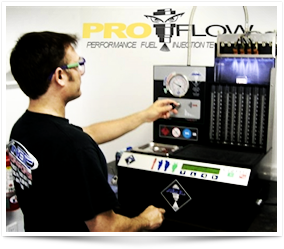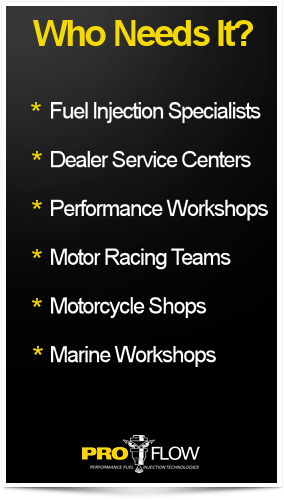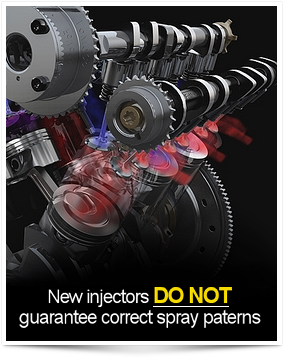Types of Fuel Injectors:
Top-Feed – Fuel enters from the in the top and exits the bottom.
Side-Feed – Fuel enters on the side on the injector fitting inside the fuel rail.
Throttle Body Injectors – (TBI) Located directly in the throttle body.
Types of Fuel Injection Systems:
Throttle body injectors or Single Point Injectors (TBI)
Single-point injection was a first step before the more complex multi-point systems came about. Not as precise as the systems that have evolved, TBI metered fuel better than a carburetor and was less expensive and easier to service.
Port or multi-point fuel injection (MPFI)
Multi-point fuel injection has a separate injector nozzle for each cylinder, just outside its intake port, which is why the system is sometimes called port injection. Delivering the fuel vapor this close to the intake port ensures that it will be drawn completely into the cylinder. The primary advantage is that MPFI meters fuel more precisely than TBI, achieving the desired air/fuel ratio. MPFI lessens the possibility that fuel will condense in the intake manifold.
Sequential fuel injection (SFI)
Sometimes called sequential port fuel injection (SPFI) or timed injection, SFI is a type of multi-port injection. Though basic MPFI uses multiple injectors that spray their fuel at the same time or in groups. Sequential fuel injection triggers each injector nozzle independently and is timed like spark plugs. SFI sprays the fuel immediately before or as the intake valve opens.
Direct injection
Direct injection delivers fuel directly into the combustion chambers, past the valves. More common in diesel engines, direct injection is gaining popularity in gasoline engine designs and is sometimes called DIG or direct injection gasoline. As with other systems, fuel metering is even more precise, and the direct injection gives engineers another variable to influence how combustion occurs in the cylinders.
Professional Fuel Injection Testing and Cleaning Services for:
Not all are listed, we service fuel injectors for other models too. Call if you have any questions.
Acura Fuel Injectors
Alfa Romeo Fuel Injectors
American Motors
Audi Fuel Injectors
Bentley Fuel Injectors
BMW Fuel Injectors
Buick Fuel Injectors
Cadillac Fuel Injectors
Chevrolet Fuel Injectors
Chrysler Fuel Injectors
Daewoo Fuel Injectors
Dodge Fuel Injectors
Eagle Fuel Injectors
Ferrari Fuel Injectors
Fiat Fuel Injectors
Ford Fuel Injectors
Geo Fuel Injectors
GMC Fuel Injectors
Holden Fuel Injectors
Honda Fuel Injectors
Hyundai Fuel Injectors
Infiniti Fuel Injectors
Isuzu Fuel Injectors
Jaguar Fuel Injectors
Jeep Fuel Injectors
Kia Fuel Injectors
Lancia Fuel Injectors
Lexus Fuel Injectors
Lincoln Fuel Injectors
Mazda Fuel Injectors
Mercedes Benz Fuel Injectors
Mercury Fuel Injectors
Merkur Fuel Injectors
Mitsubishi Fuel Injectors
Nissan Fuel Injectors
Oldsmobile Fuel Injectors
Plymouth Fuel Injectors
Pontiac Fuel Injectors
Porsche Fuel Injectors
Range Rover Fuel Injectors
Renault Fuel Injectors
Rolls Royce Fuel Injectors
Rover Fuel Injectors
Saab Fuel Injectors
Saturn Fuel Injectors
Seat Fuel Injectors
Subaru Fuel Injectors
Suzuki Fuel Injectors
Toyota Fuel Injectors
Triumph Fuel Injectors
Volkswagen Fuel Injectors
Volvo Fuel Injectors
Yamaha Fuel Injectors
















